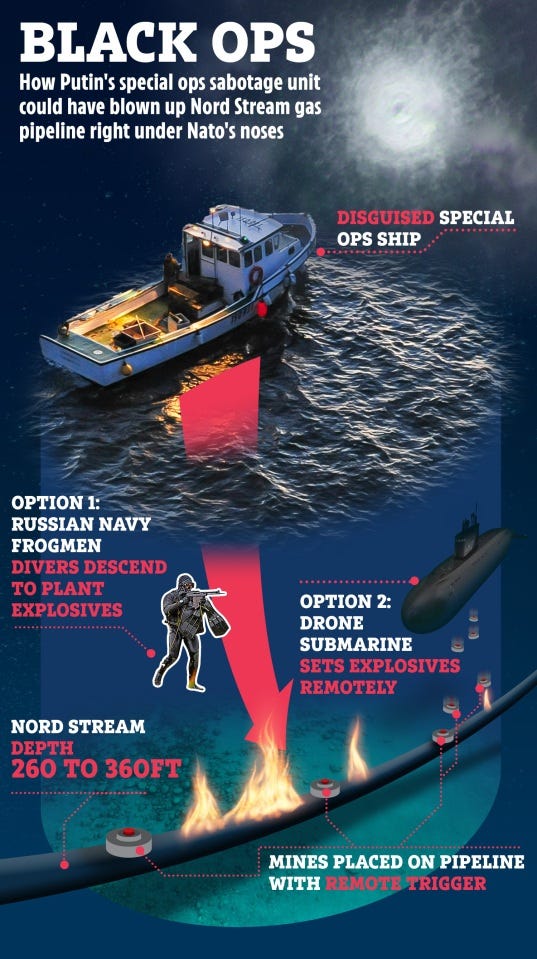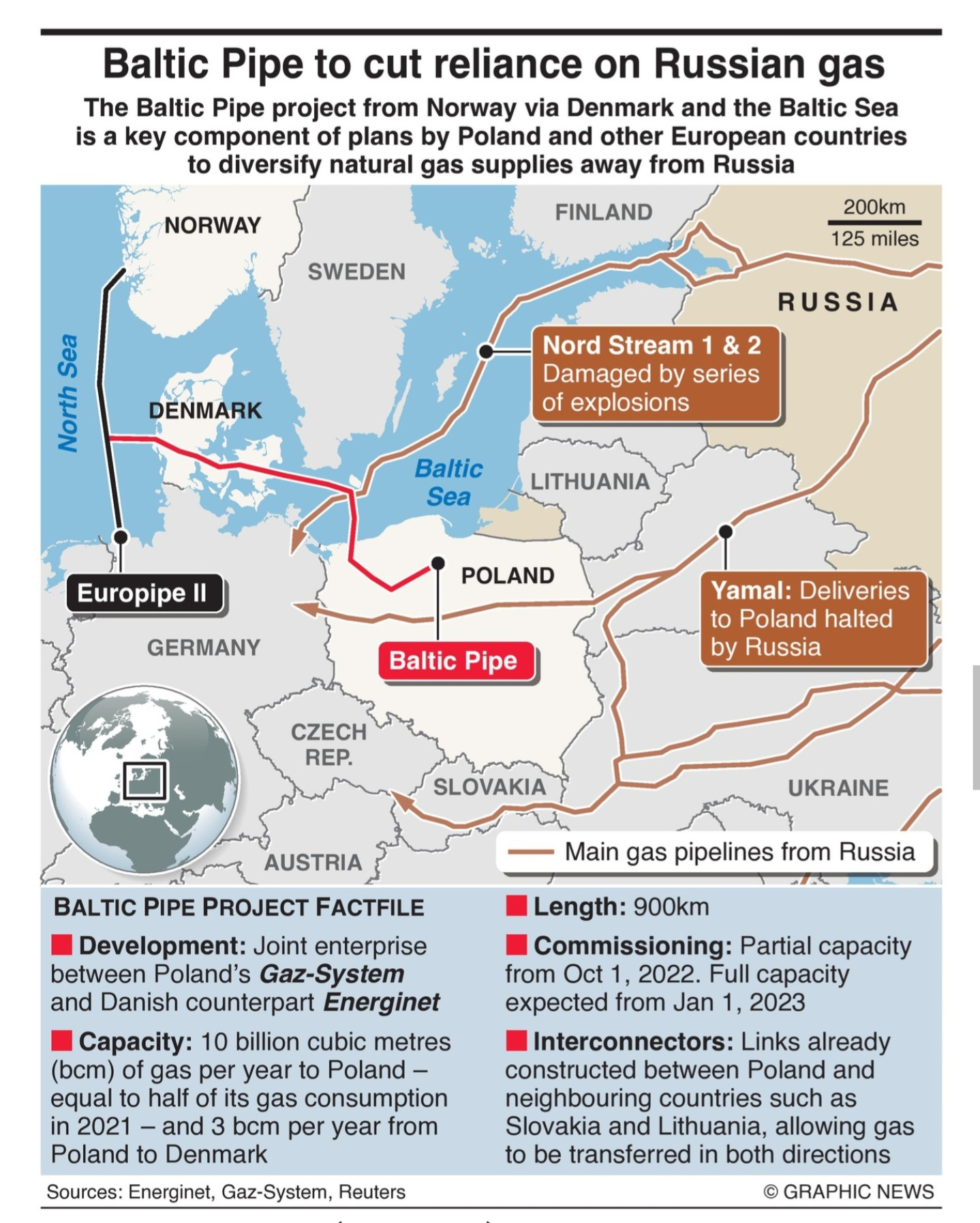Did Russia Really Blow Up the Nord Stream Undersea Gas Pipelines?
Absolutely Maybe Probably Not
ANALYSIS – In late September three different pipes from the Nord Stream undersea gas pipelines, long criticized by former President Trump, and other conservatives in the U.S. and Europe for making NATO reliant on Russian energy, were apparently sabotaged.
Of course, Trump, et al’s warnings proved prescient as Vladimir Putin has manipulated gas supplies and threatened total cutoffs to Europe in his energy war against NATO since the invasion of Ukraine.
And now Putin's fuel line to Europe has been partly severed.
One of the three undersea pipes sabotaged was part of the new Nord Stream 2 pipeline that was unused but still filled with natural gas, and in the future could take copious amounts more gas from Northwestern Russia under the Baltic Sea to Northern Germany.
The other two pipes belonged to the older Nord Stream 1 pipeline.
Both pipelines and their three pipes pass former Soviet colonies: Estonia, Latvia, Lithuania and Poland, under the waters of the Baltic.
Nord Stream 2 has been blocked from becoming fully operational by Western nations as part of our sanctions against Russia over its war in Ukraine.
Many in the West were quick to blame Russia for the likely attacks. Russia had the means (advanced undersea warfare capabilities) and the opportunity (Russian warships and submarines were reportedly spotted near the sabotage sites around the same time).
Under current circumstances, this was the easiest position to take.
However, what was always harder to show was motive.
Some argued that Putin was somehow trying to bully or threaten NATO with this attack, perhaps as a show of what future asymmetrical escalation might look like.
But, from the beginning, critics asked why Putin would do this.
The gas flowing through those pipelines is a huge point of leverage for him, and it is far better to control the spigot in Russia than ruin the conduits underwater.
It is also a far riskier move.
But, despite Moscow’s repeated denials and protestations, news reports kept pointing to Russia as the culprit – usually with only circumstantial evidence.
Now, like a lot of initially flawed reporting on a host of topics, we are seeing admissions in the U.S. press that maybe Russia didn’t do it after all.
Sources tell The Washington Post that they don’t actually have any direct evidence Russia was involved — even as they say they’re not ruling it out either.
According to an extensive investigation by the Post:
“THERE IS NO EVIDENCE AT THIS POINT THAT RUSSIA WAS BEHIND THE SABOTAGE,” SAID ONE EUROPEAN OFFICIAL, ECHOING THE ASSESSMENT OF 23 DIPLOMATIC AND INTELLIGENCE OFFICIALS IN NINE COUNTRIES INTERVIEWED IN RECENT WEEKS.
SOME WENT SO FAR AS TO SAY THEY DIDN’T THINK RUSSIA WAS RESPONSIBLE. OTHERS WHO STILL CONSIDER RUSSIA A PRIME SUSPECT SAID POSITIVELY ATTRIBUTING THE ATTACK — TO ANY COUNTRY — MAY BE IMPOSSIBLE.
The Post added:
NO ONE DOUBTS THAT THE DAMAGE WAS DELIBERATE. AN OFFICIAL WITH THE GERMAN GOVERNMENT, WHICH IS CONDUCTING ITS OWN INVESTIGATION, SAID EXPLOSIVES APPEAR TO HAVE BEEN PLACED ON THE OUTSIDE OF THE STRUCTURES.
BUT EVEN THOSE WITH INSIDE KNOWLEDGE OF THE FORENSIC DETAILS DON’T CONCLUSIVELY TIE RUSSIA TO THE ATTACK, OFFICIALS SAID, SPEAKING ON THE CONDITION OF ANONYMITY TO SHARE INFORMATION ABOUT THE PROGRESS OF THE INVESTIGATION, SOME OF WHICH IS BASED ON CLASSIFIED INTELLIGENCE.
So, it is clear that the sabotage was deliberate. It is also clear that only highly capable and sophisticated state actors could have done it.
That rules out Ukraine, which is far too busy right now and doesn’t have the capability.
And while Germany has the capability, it is highly unlikely to have destroyed its own access to this gas. France is likely in the same boat as Germany.
The Scandinavian countries could have the means, and ample reason to cut off the Russian gas to favor their own energy supplies, but it is very unlikely any of them would risk taking such actions in the midst of a major shooting war, and with Sweden and Finland rushing to join NATO.
The three former Soviet colonies in Baltics (Latvia, Lithuania and Estonia) have direct access and would love to see Europe less dependent on Russian energy, as they believe they could be sacrificed next to preserve the Russian gas flow, but they lack the advanced capabilities.
This leaves Poland, which definitely has access, similar motive, and maybe some means.
The Baltic Pipe project started pumping gas to Poland, four days after sabotage attacks damaged the Nord Stream network and terminated Russia’s biggest supply route to Europe.
This 560-mile (900km) pipeline pumps gas from Norway to Denmark and via the Baltic Sea to Poland. It also enables gas to flow to Denmark from Poland.
But Poland probably could never do it alone, nor do it without the support and cover of a major allied power.
So, we have the United States, which has means, motive and opportunity.
But, due to the high escalation risk involved, both militarily and public relations wise, as well as Joe Biden’s aversion to be seen as damaging the environment (this attack reportedly created the worst single “climate change” incident in recent history because of the large release of methane gas), direct U.S. involvement seems less likely.
More likely, the U.S. was aware, but turned a blind eye. Or quietly supported it behind the scenes.
That only leaves one major NATO player with means, motive and opportunity to coordinate such a dramatic undertaking – Great Britain.
The U.K. could have been the major power ‘cutout’ used to help Poland sabotage the pipelines and then blame Russia.
Meanwhile, while not proffering any evidence, Russia has only singled out one country to blame for the sabotage - Great Britain.
https://www.upstreamonline.com/politics/russia-blames-uk-for-nord-stream-pipelines-sabotage/2-1-1343693
https://www.reuters.com/world/europe/kremlin-considering-further-steps-over-allegation-britain-attacked-nord-stream-2022-11-01/
Of course, the UK denies this.
https://news.sky.com/story/uk-accuses-russia-of-peddling-false-claims-after-moscow-blames-royal-navy-for-nord-stream-pipeline-blasts-12733132
Meanwhile, these scenarios are all speculation and a way to present alternate hypotheses.
While Russia may still turn out to be the culprit for perverse reasons we can’t see — for now, we may have to settle for not knowing for certain.
Or maybe it was Colonel Mustard in the Baltic Sea library with the lead pipe explosives all along.
TO READ MORE FROM ME, PLEASE GO TO:
www.americanlibertydefense.news
TO LEARN MORE ABOUT ME, AND/OR MESSAGE ME, PLEASE GO TO:
www.paulcrespo.com










it is very bright your analysis. i am a real fan of yours but i only fall in love with james bond when he is a tall dark and mysterious man. No joke, you are super good analysis. From the girl who came from the north. anne campagna